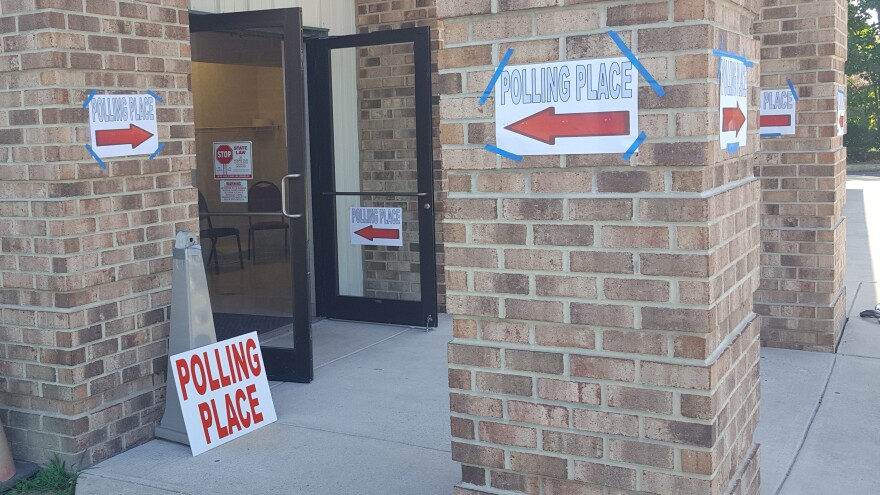Delaware is piloting a new electronic ballot marking and cloud-based storage system for a limited population of voters during its presidential primary next month.
So far more than 700 disabled or overseas voters have returned absentee ballots for the upcoming election using the system — which is made by Democracy Live and stored in an Amazon Web Services environment, according to State Election Commissioner Anthony Albence. A couple hundred more have used the tool to mark their ballots, then submitted them by email, mail or fax. Albence says his Department has been happy with the system’s performance so far.
Last week NPR reported Delaware is the second state to try internet- or cloud-based voting for small portions of its electorate. Albence notes the state has accepted votes trasmitted over email before. Still, he rejects the term “internet voting” to describe the new Democracy Live system.
Cybersecurity experts disagree.
“With any system like what Delaware is doing, the entire voting system now for these voters is taking place online,” said J. Alex Halderman, a professor of computer science and engineering at University of Michigan and co-founder of an internet security company. “That means all of the risks of foreign hacking are unfortunately at play.”
Halderman was among a number of cybersecurity experts to sign an open letter to public officials early last month warning that "internet voting" is not a secure solution to voting during the coronavirus pandemic, or for the "foreseeable future."
Halderman says Democracy Live’s platform has yet to be thoroughly vetted. He says vulnerabilities to such voting systems can emerge when the vote is transmitted online or if a voter’s personal computer is infected with malware. But he says with a relatively small number of voters in Delaware using the system, the risk remains fairly low.
“But the risk of course is after doing a small pilot like that, other voters will naturally wonder why they can’t participate in the same system too,” he said. “As the usage grows, the threat also grows astronomically.”
Albence says there is no plan yet to expand access to the new system to all of Delaware’s electorate.
Albence notes the populations allowed to use the new Democracy Live system have been able to mark ballots digitally and submit them by email for years.
He says the state of Delaware began offering overseas citizens the option of returning their ballots by email in 2010, and those voting absentee due to illness or physical disability the same option in 2012. The Department of Elections offered an in-house digital ballot marking tool to these voters as well, says Albence, but a system changeover last fall made this tool incompatible.
Albence sees the new Democracy Live system as more convenient and secure.
“The information will be transmitted securely by electronic means to the voters,” he said. “They have a secure environment in which to mark the ballots, make their choices, and then we retrieve the information. Once we retrieve it, it’s downloaded into a paper ballot. The paper ballot is incorporated into the other absentee ballots and auditable just like any other ballot.”
Albence says on the Amazon Web Services cloud where the vote is stored, elections officials can see an “audit trail” of who has accessed the data.
“It’s actually an ideal, much better environment for this type of operation to occur,” he said.
Albence adds the digital ballot marking tool in the new system has greater compatibility with accessibility devices some disabled voters use than the old, in-house system did.
Beth Mineo, director of the University of Delaware’s Center for Disabilities Studies, says this is important.
“A lot of people who are reliant on assistive technology already have their own personal product, whether it’s for communication or computer access,” she said. “In order to register their vote on a paper ballot, they would have to engage somebody else to take that step at their direction, which at times can open up the question of whose vote was it. But this is much more direct from the person to the system.”
But Mineo fears security advocates’ criticisms of the system could cause problems.
“Even if the specter of impropriety leaks into our elections, that’s a much bigger problem,” she said. “Even if we have confidence in the system, are there going to be people who point to it and say, ‘We’re not sure that we can count these votes’? It does concern me that if this option is only afforded to people with disabilities, and if at the end of the day someone is going to call that group of votes into question, that could really silence the voices of a pretty substantial subgroup of our citizenry.”
Mineo and other disability rights advocates argue more needs to be done to build trust in internet-based voting systems that are accessible to disabled voters.
“I think for a lot of people, voting in person is like a celebration of what this country’s all about. It’s like a patriotic act,” said Mineo. “We get ‘I voted’ stickers, and people proudly wear them all day after they vote. I think there’s a reluctance to let that experience go. But it’s also patriotic to want everybody’s voice to be heard and every vote to count.”
Albence says the Department of Elections plans to verify the new Democracy Live system after the primary election through a study by an independent contractor.
Correction: Voters return, rather than cast, their ballots through the Democracy Live system. These ballots are cast after they are downloaded, printed and scanned alongside other absentee ballots by elections officials.








